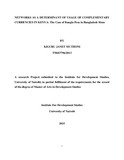| dc.description.abstract | Past studies have attributed acceptability and usage of Complementary Currencies (CCs) to social, economic and political networks. Such studies have pointed out that CCs are network goods and consultation, information sharing, resource sharing, suggestions, support, and pressure from other users enhance their usage. However, network theorists have not examined whether it is type of networks that account for the acceptability of CCs or whether it is information diffused within the networks, the size of networks and the number of networks one belongs to are more important factors in determining usage of CCs. Further, network theorists have not examined the nature of networks in an ethnically and politically heterogeneous community such as Bangladesh Slum or usage of CCs where government support is lacking.
Using a mixed method approach (triangulation) this study examined the role of networks in determining the usage of Bangla-Pesa in the very heterogeneous Bangladesh Slum and where government support is lacking on CCs. The study has established that though networks are important in determining the usage and acceptability of CCs, it is not the presence of the networks per se that is important. Rather, it is their size, number of networks a user belongs to, level of trust and the kind of information that is passed in these network meetings.
The study shows that although a large network is important, the nature of information passed about CCs has an equally important impact on usage of CCs. That is, users of BP are in more networks (large and small sized networks), with dense relationships that share positive information about BP and have high trust levels. Non-users are in fewer small sized networks, with loose relationships and where negative information about BP is shared. | en_US |

